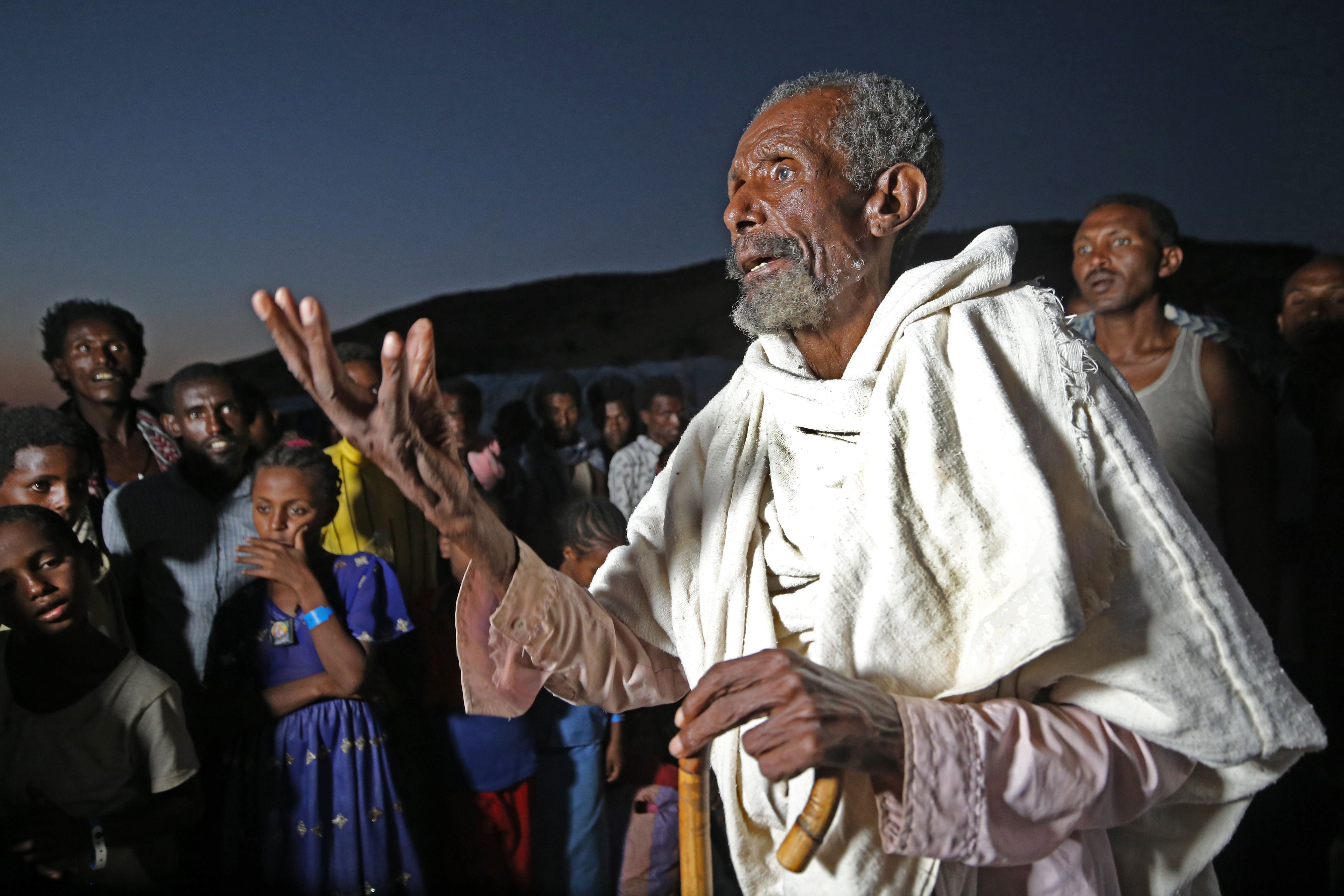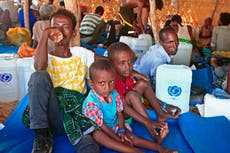Ethiopian refugees describe ‘merciless’ killings as families separated in desperate escape from Tigray
UN warn they are now preparing for as many as 200,000 refugees in Sudan as conflict escalates. Bel Trew and Mohammed Amin report


The war started just three days after Assada Barham, 27, had given birth so she was recovering in hospital when the first bombs fell. Still in her nightdress the mother-of-two from Ethiopia fled the maternity unit with her baby to grab her other son and escape the advancing front line.
She lost her husband in the chaos, and was so terrified that she fled the war-torn Tigray region without him.
“We had to keep running because the village had come under attack and bombardment from the Ethiopian army,” she says, cradling her newborn son while sitting exhausted and barefoot on a scrap of tarpaulin in a field in Hamdayat, Sudan.
She describes walking for days while being chased by military forces before finally crossing a border river to safety.
“I was forced to leave my husband behind because I couldn’t find him in time. The journey was terrible, because we had to move quickly but I couldn’t because I was carrying my children.”
“I got help from some people on the way who were fleeing like me but in the end, I have had to cope on my own, alone.”
Assada is one of an estimated 33,000 people, 12,000 of whom are children, that the United Nations says have crossed over into Sudan since fighting erupted on 4 November, when the Ethiopian government launched a military operation in the semi-autonomous region of Tigray.
Tigray is home to five million people and controlled by the Tigray People’s Liberation Front (TPLF), which has been at loggerheads with the government of Ethiopia’s Nobel-peace prize winning prime minister Abiy Ahmed since it refused to join a ruling coalition last year.
Tensions soared when it held its own elections in September, after the government postponed the vote in the summer, ostensibly due to the pandemic.
Accusing the TPLF of treason, Mr Ahmed ordered the offensive which he said was in response to an alleged TPLF attack on a federal military base.
Nearly three weeks on, there is little hope of an end to the fighting.
The prime minister has vowed a “final and crucial” victory after warning that a three-day deadline for Tigrayan forces to surrender had expired. TPLF leader Debretsion Gebremichael called on all Tigrayans, including children, to mobilise. On Thursday, officials said Ethiopia’s latest airstrike hit Tigray university, though it was not immediately clear if anyone was killed or wounded in the attack.
Aid agencies are now warning that the conflict has sparked a “devastating” humanitarian crisis that risks spilling over into the neighbouring fragile states: Tigrayan forces have already fired rockets across the border into Eritrea, after claiming Ethiopian soldiers were using an Eritrean airport to attack Tigray.
Meanwhile Sudan, a country already in the grips of its own financial crisis, is to receive as many as 200,000 refugees in the coming weeks, according to the UN.
Refugees from Tigray are now sleeping rough, with the few belongings they were able to grab before they left. Exposed to the elements, families have tried to fashion shelters out of scraps of fabric hung on trees, and the few ragged mattresses that are handed out.
They describe government forces waging a war “without any mercy”.
“The attacks are horrible … the military is using heavy weapons such as tanks, planes and artillery, so this is why the number of refugees is so big,” says Gado Fabirhawi, 40, who is now sheltering in Sudan’s Gadarif state, after she spent four days walking from her village to the border.
“Thousands have crossed the borders into Sudan but a lot are still on their way,” she adds.
Like Assada, Gado was also separated from the rest of her family in the panic. The United Nations’ child agency Unicef told The Independent they were helping manage several cases of unaccompanied children who had lost their parents and arrived in Sudan alone.
“In less than two weeks we have received over 30,000 people,” said Abdullah Fadil, Unicef’s representative in Sudan. “Thousands are still arriving every single day. The fighting isn’t stopping.”
He described how his teams were frantically trying to build latrines, deliver tanks of water and organise tents for the influx of refugees.
“People are in desperate need. There is no shelter. They are staying in the open marketplaces.
“We have begun to provide them with shelter and plastic sheeting, but the situation is dire.”
A complete telecommunications blackout in Tigray and the lack of access means that aid agencies and human rights organisations are unsure of the scale of the region’s crisis.
Unicef estimate as many as 2.3 million children are in need of humanitarian assistance in the region, particularly as many are already suffering from acute malnutrition. Even before the fighting a locust outbreak had destroyed vital crops.
Rights workers say that access to food and money is now scarce, banks have closed, there is no power, fuel is running out and transport is near impossible to find. Trucks laden with food, fuel and medical supplies have been stuck outside the region’s borders for weeks.
UN spokesperson Stephane Dujarric also raises concerns about the nearly 100,000 Eritrean refugees who live in camps in northern Tigray that are dangerously close to the front line.
There, fuel for generators has run out, halting access to clean water supplies.
Compounding the woes are alarming reports of ethnic violence. Amnesty International recently documented what it believes was a machete “massacre” in Mai-Kadra town in the southwest of Tigray.
The target appears to have been day labourers who were not from Tigray and not involved in the conflict but were apparently hacked to death with machetes, axes and knives.
While Amnesty was unable to confirm who was responsible for the killings, witnesses said it was a “revenge” attack against outsiders by forces loyal to the TPLF after suffering a defeat at the hands of federal forces.
Fisseha Tekle, Amnesty’s Horn of Africa researcher, said that this incident was likely just the “tip of the iceberg” as it was impossible to investigate further attacks due to the lack of access.
He said he feared there are many more incidences of inter-communal violence that have yet to be documented.
As federal forces close in on Mekelle, the capital of Tigray region, experts warn of a uptick in insurgency operations by Tigrayan rebels who are unlikely to surrender and accept federal rule.
Tibor Nagy, US assistant secretary of state, said on Thursday evening that “neither party” was interested in mediation. There has also been little progress in opening humanitarian corridors.
Back in Sudan, Unicef was busy re-opening refugee camps that were first used 20 years ago during the previous conflict between Ethiopia and Eritrea. They hope to use the pre-existing infrastructure to house the influx of refugees amid predictions that there could be as many as 200,000 crossing over the next few months.
In one of those re-opened camps, Tigrayan refugee Isho Fasha, 50, said she felt that the Ethiopian government forces were waging a war “without mercy”.
“The air force has bombed civilians, properties, animals and crops … They have also used tanks and other heavy weapons and sometimes even knives, it looks like they have orders to kill everyone,” she tells The Independent, while flanked by her grandchildren.
The family has little hope of returning home soon and were struggling to cope in the makeshift camp.
“The situation in the camp is very bad and poor, so although we thank Sudan for hosting us, we ask the world to intervene and provide the basic needs of shelters, food and water.”



Join our commenting forum
Join thought-provoking conversations, follow other Independent readers and see their replies
Comments